- Home
- George Orwell
Homage to Catalonia Page 4
Homage to Catalonia Read online
Page 4
In other ways we were not badly off. The food was good enough and there was plenty of wine. Cigarettes were still being issued at the rate of a packet a day, matches were issued every other day, and there was even an issue of candles. They were very thin candles, like those on a Christmas cake, and were popularly supposed to have been looted from churches. Every dug-out was issued daily with three inches of candle, which would burn for about twenty minutes. At that time it was still possible to buy candles, and I had brought several pounds of them with me. Later on the famine of matches and candles made life a misery. You do not realize the importance of these things until you lack them. In a night-alarm, for instance, when everyone in the dug-out is scrambling for his rifle and treading on everybody else's face, being able to strike a light may make the difference between life and death. Every militiaman possessed a tinder-lighter and several yards of yellow wick. Next to his rifle it was his most important possession. The tinder-lighters had the great advantage that they could be struck in a wind, but they would only smoulder, so that they were no use for lighting a fire. When the match famine was at its worst our only way of producing a flame was to pull the bullet out of a cartridge and touch the cordite off with a tinder-lighter.
It was an extraordinary life that we were living - an extraordinary way to be at war, if you could call it war. The whole militia chafed against the inaction and clamoured constantly to know why we were not allowed to attack. But it was perfectly obvious that there would be no battle for a long while yet, unless the enemy started it. Georges Kopp, on his periodical tours of inspection, was quite frank with us. 'This is not a war,' he used to say, 'it is a comic opera with an occasional death.' As a matter of fact the stagnation on the Aragon front had political causes of which I knew nothing at that time; but the purely military difficulties - quite apart from the lack of reserves of men - were obvious to anybody.
To begin with, there was the nature of the country. The front line, ours and the Fascists', lay in positions of immense natural strength, which as a rule could only be approached from one side. Provided a few trenches have been dug, such places cannot be taken by infantry, except in overwhelming numbers. In our own position or most of those round us a dozen men with two machine-guns could have held off a battalion. Perched on the hill-tops as we were, we should have made lovely marks for artillery; but there was no artillery. Sometimes I used to gaze round the landscape and long - oh, how passionately! - for a couple of batteries of guns. One could have destroyed the enemy positions one after another as easily as smashing nuts with a hammer. But on our side the guns simply did not exist. The Fascists did occasionally manage to bring a gun or two from Saragossa and fire a very few shells, so few that they never even found the range and the shells plunged harmlessly into the empty ravines. Against machine-guns and without artillery there are only three things you can do: dig yourself in at a safe distance - four hundred yards, say - advance across the open and be massacred, or make small-scale night-attacks that will not alter the general situation. Practically the alternatives are stagnation or suicide.
And beyond this there was the complete lack of war materials of every description. It needs an effort to realize how badly the militias were armed at this time. Any public school OTC in England is far more like a modern army than we were. The badness of our weapons was so astonishing that it is worth recording in detail.
For this sector of the front the entire artillery consisted of four trench-mortars with fifteen rounds for each gun. Of course they were far too precious to be fired and the mortars were kept in Alcubierre. There were machine-guns at the rate of approximately one to fifty men; they were oldish guns, but fairly accurate up to three or four hundred yards. Beyond this we had only rifles, and the majority of the rifles were scrap-iron. There were three types of rifle in use. The first was the long Mauser. These were seldom less than twenty years old, their sights were about as much use as a broken speedometer, and in most of them the rifling was hopelessly corroded; about one rifle in ten was not bad, however. Then there was the short Mauser, or mousqueton, really a cavalry weapon. These were more popular than the others because they were lighter to carry and less nuisance in a trench, also because they were comparatively new and looked efficient. Actually they were almost useless. They were made out of reassembled parts, no bolt belonged to its rifle, and three-quarters of them could be counted on to jam after five shots. There were also a few Winchester rifles. These were nice to shoot with, but they were wildly inaccurate, and as their cartridges had no clips they could only be fired one shot at a time. Ammunition was so scarce that each man entering the line was only issued with fifty rounds, and most of it was exceedingly bad. The Spanish-made cartridges were all refills and would jam even the best rifles. The Mexican cartridges were better and were therefore reserved for the machine-guns. Best of all was the German-made ammunition, but as this came only from prisoners and deserters there was not much of it. I always kept a clip of German or Mexican ammunition in my pocket for use in an emergency. But in practice when the emergency came I seldom fired my rifle; I was too frightened of the beastly thing jamming and too anxious to reserve at any rate one round that would go off.
We had no tin hats, no bayonets, hardly any revolvers or pistols, and not more than one bomb between five or ten men. The bomb in use at this time was a frightful object known as the 'FAI bomb', it having been produced by the Anarchists in the early days of the war. It was on the principle of a Mills bomb, but the lever was held down not by a pin but a piece of tape. You broke the tape and then got rid of the bomb with the utmost possible speed. It was said of these bombs that they were 'impartial'; they killed the man they were thrown at and the man who threw them. There were several other types, even more primitive but probably a little less dangerous - to the thrower, I mean. It was not till late March that I saw a bomb worth throwing.
And apart from weapons there was a shortage of all the minor necessities of war. We had no maps or charts, for instance. Spain has never been fully surveyed, and the only detailed maps of this area were the old military ones, which were almost all in the possession of the Fascists. We had no range-finders, no telescopes, no periscopes, no field-glasses except a few privately-owned pairs, no flares or Very lights, no wire-cutters, no armourers' tools, hardly even any cleaning materials. The Spaniards seemed never to have heard of a pull-through and looked on in surprise when I constructed one. When you wanted your rifle cleaned you took it to the sergeant, who possessed a long brass ramrod which was invariably bent and therefore scratched the rifling. There was not even any gun oil. You greased your rifle with olive oil, when you could get hold of it; at different times I have greased mine with vaseline, with cold cream, and even with bacon-fat. Moreover, there were no lanterns or electric torches - at this time there was not, I believe, such a thing as an electric torch throughout the whole of our sector of the front, and you could not buy one nearer than Barcelona, and only with difficulty even there.
As time went on, and the desultory rifle-fire rattled among the hills, I began to wonder with increasing scepticism whether anything would ever happen to bring a bit of life, or rather a bit of death, into this cock-eyed war. It was pneumonia that we were fighting against, not against men. When the trenches are more than five hundred yards apart no one gets hit except by accident. Of course there were casualties, but the majority of them were self-inflicted. If I remember rightly, the first five men I saw wounded in Spain were all wounded by our own weapons - I don't mean intentionally, but owing to accident or carelessness. Our worn-out rifles were a danger in themselves. Some of them had a nasty trick of going off if the butt was tapped on the ground; I saw a man shoot himself through the hand owing to this. And in the darkness the raw recruits were always firing at one another. One evening when it was barely even dusk a sentry let fly at me from a distance of twenty yards; but he missed me by a yard - goodness knows how many times the Spanish standard of marksmanship has saved my life. Another time I had gone out o
n patrol in the mist and had carefully warned the guard commander beforehand. But in coming back I stumbled against a bush, the startled sentry called out that the Fascists were coming, and I had the pleasure of hearing the guard commander order everyone to open rapid fire in my direction. Of course I lay down and the bullets went harmlessly over me. Nothing will convince a Spaniard, at least a young Spaniard, that fire-arms are dangerous. Once, rather later than this, I was photographing some machine-gunners with their gun, which was pointed directly towards me.
'Don't fire,' I said half-jokingly as I focused the camera.
'Oh no, we won't fire.'
The next moment there was a frightful roar and a stream of bullets tore past my face so close that my cheek was stung by grains of cordite. It was unintentional, but the machine-gunners considered it a great joke. Yet only a few days earlier they had seen a mule-driver accidentally shot by a political delegate who was playing the fool with an automatic pistol and had put five bullets in the mule-driver's lungs.
The difficult passwords which the army was using at this time were a minor source of danger. They were those tiresome double passwords in which one word has to be answered by another. Usually they were of an elevating and revolutionary nature, such as Cultura - progreso, or Seremos - invencibles, and it was often impossible to get illiterate sentries to remember these highfalutin' words. One night, I remember, the password was Cataluna - heroica, and a moon-faced peasant lad named Jaime Domenech approached me, greatly puzzled, and asked me to explain.
'Heroica - what does heroica mean?'
I told him that it meant the same as valiente. A little while later he was stumbling up the trench in the darkness, and the sentry challenged him:
'Alto! Cataluna!'
'Valiente!' yelled Jaime, certain that he was saying the right thing.
Bang!
However, the sentry missed him. In this war everyone always did miss everyone else, when it was humanly possible.
Chapter IV
When I had been about three weeks in the line a contingent of twenty or thirty men, sent out from England by the ILP, arrived at Alcubierre, and in order to keep the English on this front together Williams and I were sent to join them. Our new position was at Monte Trazo, several miles further west and within sight of Saragossa.
The position was perched on a sort of razor-back of limestone with dug-outs driven horizontally into the cliff like sand-martins' nests. They went into the ground for prodigious distances, and inside they were pitch dark and so low that you could not even kneel in them, let alone stand. On the peaks to the left of us there were two more POUM positions, one of them an object of fascination to every man in the line, because there were three militia-women there who did the cooking. These women were not exactly beautiful, but it was found necessary to put the position out of bounds to men of other companies. Five hundred yards to our right there was a PSUC post at the bend of the Alcubierre road. It was just here that the road changed hands. At night you could watch the lamps of our supply-lorries winding out from Alcubierre and, simultaneously, those of the Fascists coming from Saragossa. You could see Saragossa itself, a thin string of lights like the lighted port-holes of a ship, twelve miles southwestward. The Government troops had gazed at it from that distance since August 1936, and they are gazing at it still.
There were about thirty of ourselves, including one Spaniard (Ramon, Williams's brother-in-law), and there were a dozen Spanish machine-gunners. Apart from the one or two inevitable nuisances - for, as everyone knows, war attracts riff-raff - the English were an exceptionally good crowd, both physically and mentally. Perhaps the best of the bunch was Bob Smillie - the grandson of the famous miners' leader - who afterwards died such an evil and meaningless death in Valencia. It says a lot for the Spanish character that the English and the Spaniards always got on well together, in spite of the language difficulty. All Spaniards, we discovered, knew two English expressions. One was 'OK, baby,' the other was a word used by the Barcelona whores in their dealings with English sailors, and I am afraid the compositors would not print it.
Once again there was nothing happening all along the line: only the random crack of bullets and, very rarely, the crash of a Fascist mortar that sent everyone running to the top trench to see which hill the shells were bursting on. The enemy was somewhat closer to us here, perhaps three or four hundred yards away. Their nearest position was exactly opposite ours, with a machine-gun nest whose loopholes constantly tempted one to waste cartridges. The Fascists seldom bothered with rifle-shots, but sent bursts of accurate machine-gun fire at anyone who exposed himself. Nevertheless it was ten days or more before we had our first casualty. The troops opposite us were Spaniards, but according to the deserters there were a few German NCOs among them. At some time in the past there had also been Moors there - poor devils, how they must have felt the cold! - for out in no-man's-land there was a dead Moor who was one of the sights of the locality. A mile or two to the left of us the line ceased to be continuous and there was a tract of country, lower-lying and thickly wooded, which belonged neither to the Fascists nor ourselves. Both we and they used to make daylight patrols there. It was not bad fun in a Boy Scoutish way, though I never saw a Fascist patrol nearer than several hundred yards. By a lot of crawling on your belly you could work your way partly through the Fascist lines and could even see the farm-house flying the monarchist flag, which was the local Fascist headquarters. Occasionally we gave it a rifle-volley and then slipped into cover before the machine-guns could locate us. I hope we broke a few windows, but it was a good eight hundred metres away, and with our rifles you could not make sure of hitting even a house at that range.
The weather was mostly clear and cold; sometimes sunny at midday, but always cold. Here and there in the soil of the hill-sides you found the green beaks of wild crocuses or irises poking through; evidently spring was coming, but coming very slowly. The nights were colder than ever. Coming off guard in the small hours we used to rake together what was left of the cook-house fire and then stand in the red-hot embers. It was bad for your boots, but it was very good for your feet. But there were mornings when the sight of the dawn among the mountain-tops made it almost worthwhile to be out of bed at godless hours. I hate mountains, even from a spectacular point of view. But sometimes the dawn breaking behind the hill-tops in our rear, the first narrow streaks of gold, like swords slitting the darkness, and then the growing light and the seas of carmine cloud stretching away into inconceivable distances, were worth watching even when you had been up all night, when your legs were numb from the knees down and you were sullenly reflecting that there was no hope of food for another three hours. I saw the dawn oftener during this campaign than during the rest of my life put together - or during the part that is to come, I hope.
We were short-handed here, which meant longer guards and more fatigues. I was beginning to suffer a little from the lack of sleep which is inevitable even in the quietest kind of war. Apart from guard-duties and patrols there were constant night-alarms and stand-to's, and in any case you can't sleep properly in a beastly hole in the ground with your feet aching with the cold. In my first three or four months in the line I do not suppose I had more than a dozen periods of twenty-four hours that were completely without sleep; on the other hand I certainly did not have a dozen nights of full sleep. Twenty or thirty hours' sleep in a week was quite a normal amount. The effects of this were not so bad as might be expected; one grew very stupid, and the job of climbing up and down the hills grew harder instead of easier, but one felt well and one was constantly hungry - heavens, how hungry! All food seemed good, even the eternal haricot beans which everyone in Spain finally learned to hate the sight of. Our water, what there was of it, came from miles away, on the backs of mules or little persecuted donkeys. For some reason the Aragon peasants treated their mules well but their donkeys abominably. If a donkey refused to go it was quite usual to kick him in the testicles. The issue of candles had ceased, and matches were
running short. The Spaniards taught us how to make olive oil lamps out of a condensed milk tin, a cartridge-clip, and a bit of rag. When you had any olive oil, which was not often, these things would burn with a smoky flicker, about a quarter candle-power, just enough to find your rifle by.
There seemed no hope of any real fighting. When we left Monte Pocero I had counted my cartridges and found that in nearly three weeks I had fired just three shots at the enemy. They say it takes a thousand bullets to kill a man, and at this rate it would be twenty years before I killed my first Fascist. At Monte Trazo the lines were closer and one fired oftener, but I am reasonably certain that I never hit anyone. As a matter of fact, on this front and at this period of the war the real weapon was not the rifle but the megaphone. Being unable to kill your enemy you shouted at him instead. This method of warfare is so extraordinary that it needs explaining.

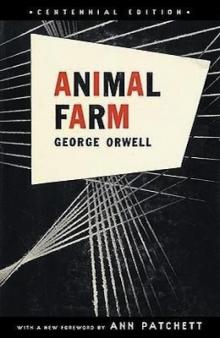 Animal Farm & 1984
Animal Farm & 1984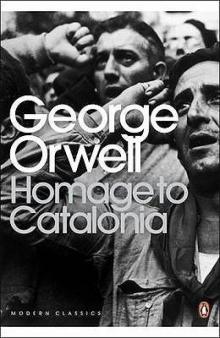 Homage to Catalonia
Homage to Catalonia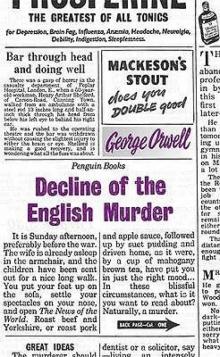 Decline of the English Murder
Decline of the English Murder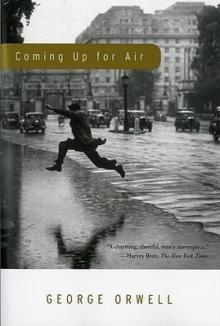 Coming Up for Air
Coming Up for Air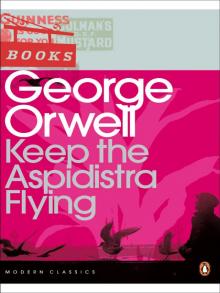 Keep the Aspidistra Flying
Keep the Aspidistra Flying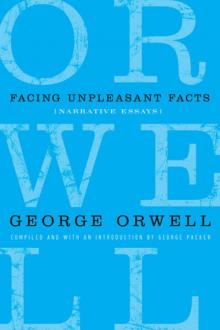 Facing Unpleasant Facts: Narrative Essays
Facing Unpleasant Facts: Narrative Essays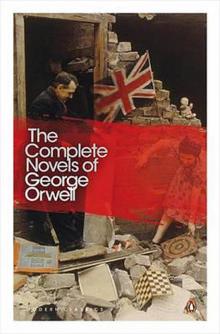 The Complete Novels of George Orwell
The Complete Novels of George Orwell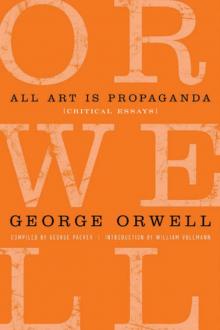 All Art Is Propaganda: Critical Essays
All Art Is Propaganda: Critical Essays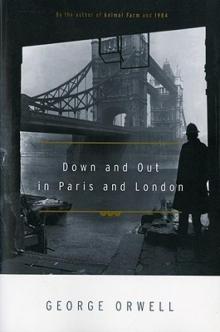 Down and Out in Paris and London
Down and Out in Paris and London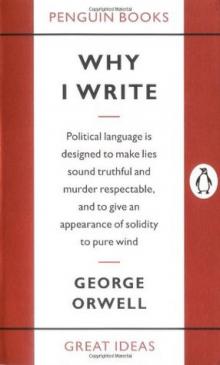 Why I Write
Why I Write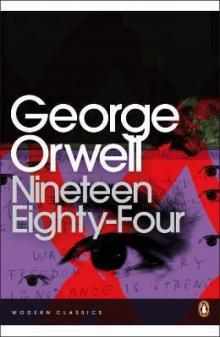 Nineteen Eighty-Four
Nineteen Eighty-Four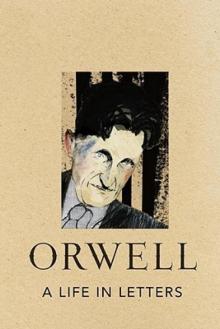 A Life in Letters
A Life in Letters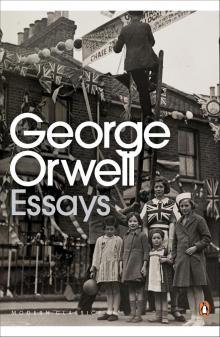 Essays
Essays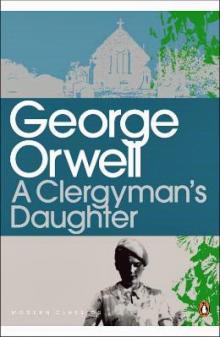 A Clergyman's Daughter
A Clergyman's Daughter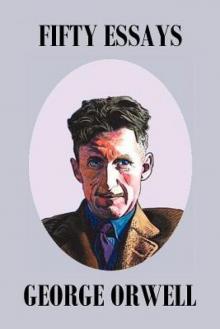 Fifty Orwell Essays
Fifty Orwell Essays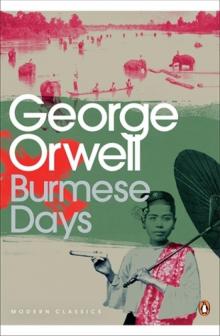 Burmese Days
Burmese Days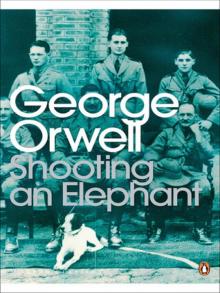 Shooting an Elephant
Shooting an Elephant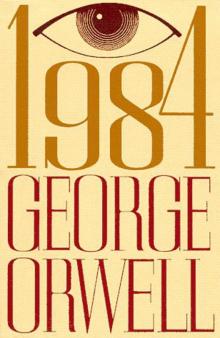 1984 (Penguin)
1984 (Penguin)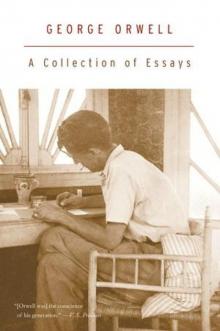 A Collection of Essays
A Collection of Essays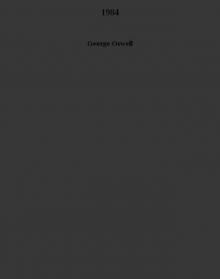 1984
1984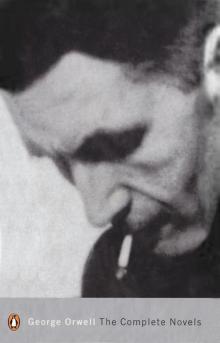 The Complete Novels
The Complete Novels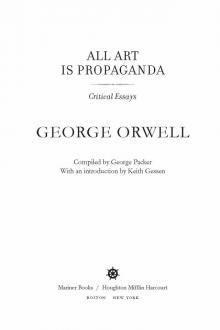 All Art Is Propaganda
All Art Is Propaganda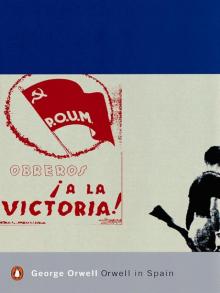 Orwell in Spain
Orwell in Spain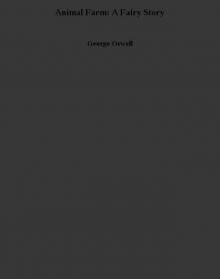 Animal Farm: A Fairy Story
Animal Farm: A Fairy Story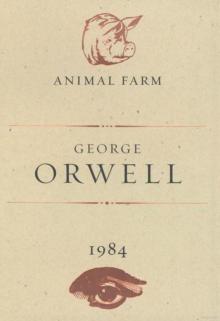 Animal Farm and 1984
Animal Farm and 1984